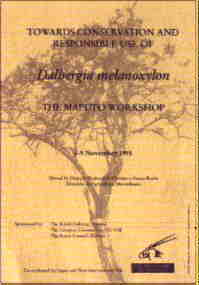 AFRICAN BLACKWOOD CONSERVATION PROJECT
AFRICAN BLACKWOOD CONSERVATION PROJECTAt the invitation of the Mozambique Government, Sound/Wood coordinated a workshop on mpingo in Maputo, Mozambique in November, 1995. Over 4 days 44 participants discussed the
 species and prepared a regional conservation and management strategy.
Government forestry representatives were present from the principal states where mpingo is found: Kenya, Malawi, Mozambique, Tanzania, Uganda and Zimbabwe. Experts from universities in Maputo and Dar es Salaam (Tanzania), carver's co-operatives and sawmill representatives from Kenya, Mozambique and Tanzania, as well as the world's leading dealer of timbers for instrument-making, Theodore Nagel, made valuable contributions. CITES (Convention on International Trade in Endangered Species of Wild Fauna and Flora) experts and representatives from TRAFFIC (the wildlife trade monitoring programme of the World Wide Fund for Nature and IUCN-The World Conservation Union), the Forest Stewardship Council and the World Conservation Monitoring Centre supplied information necessary to complete the picture. Sponsors were the European Commission, the British Embassy in Maputo and the British Council and Theodore Nagel.
species and prepared a regional conservation and management strategy.
Government forestry representatives were present from the principal states where mpingo is found: Kenya, Malawi, Mozambique, Tanzania, Uganda and Zimbabwe. Experts from universities in Maputo and Dar es Salaam (Tanzania), carver's co-operatives and sawmill representatives from Kenya, Mozambique and Tanzania, as well as the world's leading dealer of timbers for instrument-making, Theodore Nagel, made valuable contributions. CITES (Convention on International Trade in Endangered Species of Wild Fauna and Flora) experts and representatives from TRAFFIC (the wildlife trade monitoring programme of the World Wide Fund for Nature and IUCN-The World Conservation Union), the Forest Stewardship Council and the World Conservation Monitoring Centre supplied information necessary to complete the picture. Sponsors were the European Commission, the British Embassy in Maputo and the British Council and Theodore Nagel.
Workshop participants formed working groups on five priority areas: information on use and trade; rsource use; research; education; and conservation and management. An agreed regional strategy emerged from these discussions. A co-ordinated approach was adopted because the individual countries experience very similar problems and the strategy will be put into action through the establishment of a network of regional and national projects. The enhancement of local community participation in the managemnent of mpingo was considered essential and projects developed as a part of the strategy will place particular emphasis on this.*
From the February 1996, Issue No. 3 of SoundWood, "A lively discussion regarding CITES concluded that it would be inappropriate to propose Mpingo for CITES listing at present. It was agreed, however, that concerted efforts were needed to collect and correlate more data so that the extent of any threat to the species arising from international trade could be assessed more fully." So though the African Blackwood Conservation Project may seem like a small step on a long journey, it is an attempt to begin now to attend to the future of Mpingo. Such steps, in concert with other efforts on its behalf, may qualify Mpingo as a managed-use, sustainable resource and prevent its banning from international trade.
The co-ordinator of SoundWood has offered to provide the Proceedings of the Maputo workshop and the Regional Strategy for Conservation of Mpingo which was the result of the conference. Excerpts will be posted here when they become available. Two Masters degree dissertations have also been created with the aid of FFI. David Beale has written "An Ecological Approach to Producing a Sustainable Mpingo Trade" which deals with the economics of mpingo. Hazel Sharman has written "An Investigation into the Sustainable Management of a Tropical Tree Species using Dalbergia melanoxylon as a case study" which uses GIS and Herbarium records to determine the species range. These may also be available to ABCP later in the summer and information relevant to this project may also be excerpted with the permission of the authors.
*The above information cited from SoundWood, February 1996, Issue No. 3.
Hazel Sharman, SoundWood Co-0rdinator
FFI, Great Eastern House
Tenison Road
Cambridge
CB1 2DT
United Kingdom
Tel: (44) (0) 1223-461471
Fax: (44) (0) 1223-461481
E-mail: info@ffint.org